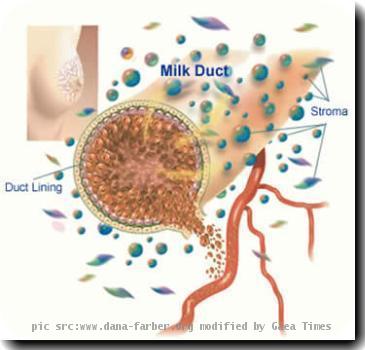Study: Breast cancer survivors can safely become Moms, no proof pregnancy linked to relapse
By Maria Cheng, APFriday, March 26, 2010
Study: Pregnancy safe for breast cancer survivors
BARCELONA, Spain — Women who survive breast cancer and have children afterwards don’t appear to be at any higher risk of dying from cancer, a new study says.
Doctors have long worried pregnancy might spark hormonal changes in breast cancer survivors that could spur the disease’s return, and many breast cancer patients are counseled against getting pregnant after they recover.
In research presented Friday at a European breast cancer conference in Barcelona, experts said pregnancy in women who have been treated for breast cancer is safe and does not seem to be linked with the disease’s recurrence.
Among women in the general population, those who have early and multiple pregnancies have a lower risk of getting breast cancer than women who don’t.
Dr. Hatem Azim of the Institute Jules Bordet in Belgium and colleagues analyzed results from 14 previous trials that followed more than 1,400 pregnant women with a history of breast cancer. Those women became pregnant several months to several years after finishing treatment. Azim and colleagues compared those women to more than 18,000 women who had had breast cancer and were not pregnant.
“I hope this changes what doctors tell their patients,” Azim said. “There’s no reason to tell women who survive breast cancer not to get pregnant.”
Azim and colleagues found that the women who got pregnant had a 42 percent lower risk of dying compared with breast cancer survivors who did not get pregnant. He said part of that benefit might be due to the fact that women who were naturally healthier were those that later had children.
But in some studies, women with breast cancer who became pregnant were compared to women who remained free of the disease, i.e. the healthiest of the breast cancer survivors.
“For many years, pregnancy was considered a risk for women who had breast cancer,” said Maria Leadbeater, a cancer expert at Breast Cancer Care, a British charity. “But this study seems to show the risk is not an issue once you’ve been treated,” she said. Leadbeater was not connected to Azim’s study.
Leadbeater said the advice for patients might vary depending on the type of breast cancer they’ve had and how they responded to treatment. Women who need hormone therapy for breast cancer typically need to be on it for five years — during which time doctors recommend against getting pregnant.
Leadbeater and others said women should try to wait until two years after their diagnosis to try for a baby, since that is thought to be the riskiest time for a relapse.
Azim, who led the study, hypothesized that the relationship between hormones and breast cancer might be more complicated than doctors initially thought. Estrogen is known to trigger breast cancer and women typically have more estrogen when they’re pregnant. But very high doses of the hormone can also kill cancer cells, Azim said.
Other hormones that are elevated in pregnancy, like the one for breast-feeding, have been proven to protect against breast cancer. “What we are seeing is only the tip of the iceberg,” Azim said. “It’s too simple to say that pregnancy stimulates hormones and that’s bad for breast cancer.”
Dr. Sibylle Loibl, an assistant professor of obstetrics and gynecology at the University of Frankfurt said Azim’s study should change what doctors tell patients.
“There’s no reason for a breast cancer survivor not to have children if she wants to,” Loibl said. She was not linked to Azim’s study.
“As long as a woman completes her treatment for breast cancer, it should not be an issue,” she said.
Tags: Barcelona, Child And Teen Health, Diseases And Conditions, Europe, Medical Research, Pregnancy And Childbirth, Sexual And Reproductive Health, Spain, Western Europe, Women's Health
|
March 27, 2010: 8:28 am
Thanks for writing the article. I am so glad to hear that as I am a young breast cancer survivor myself and have been debating whether or not I should have another child. Having breast cancer at the age of 31 (I was mis-diaganosed at 28), it is pretty devastating. It changes your plans for a family. Today I use my experience to help raise awareness among young women. |

gina